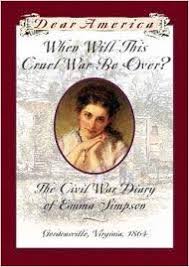When Will This Cruel War Be Over?: The Civil War Diary of Emma Simpson, Gordonsville, Virginia, 1864 (Dear America Series) – Barry Denenberg, Scholastic, 1996

No, it doesn’t actually tell all. It can’t, because, like the other books in the uneven but valuable Dear America series (I recently wrote about another by the same author), the story is told from the perspective of a girl keeping a diary. She is the daughter of a Confederate officer and his wife, living on a spacious plantation served by enslaved people, to whom she refers throughout the book as either “servants” or “negroes.” It is doubtful that such a fictional account would be published by Scholastic today, which led me to think about the differences between a character’s perspective and an author’s, and how this book insidiously blurs the space between the two, although I am certain it was not the author’s intention to do so.
Reading primary sources is a key part of studying history. In learning about the institution of slavery, the Civil War, and the horrible consequences of Reconstruction’s collapse, letters and diaries by those who supported an economy based on human chattel are crucial. One example of a real woman’s diary is that of Mary Boykin Chestnut, (1823-1886), who chronicled life on a real plantation through her role as wife, slave owner, and author. Censoring her work would by refusing to include it in school curricula would be a missed opportunity to understand the complexities of American history. Yet When Will This Cruel War Be Over? is not a historical document, but a novel for middle grade and young adult readers. The author’s choices are deliberate, presumably governed by literary standards, but also by the purpose of the series, which is to illuminate history in an engaging way.
Emma believes that she and her family, as well as their whole way of life, have been unjustly and cruelly wrecked by rampaging Yankees, who seek only to destroy their property and liberate their slaves. Emma is thankful that at least some of her “servants” are unswervingly loyal, and would no sooner think of abandoning their beloved masters than she or parents who think of disciplining them harshly. Emma’s father, she writes, has always believed that physically harming slaves is not immoral, but an error of management techniques—except in the few circumstances where there is no other choice. There are numerous references in the diary to other enslaved people living on the land of less unenlightened planters, who stubbornly refuse to recognize that their servitude is for their own good.
What would I expect of a book that is based on the perspective of a young woman born into a society based on a racial hierarchy in which enslaved people have to rights and no humanity? Would it be more truthful to artificially insert phrases which imply that such a character would empathize with her “servants,” and come to realize that her entire life is predicate on depriving others of their most basic human rights? That, in a sense, would be more misleading to young readers than this book. Would it be possible, then, to offer hints in the narrative that not everyone accepts her belief, that the phrase “When will this cruel war be over” is hideously ironic? Possibly. The author implicitly acknowledges this possibility by having some characters, less empathic than Emma’s parents, state that even bad abolitionists believe that black people are inherently inferior. Emma expresses some skepticism about this assertion. Her own mother runs a “school” for enslaved children on their plantation; Emma never seems to question what the purpose of their education is in a world of endless, inherited, status as human property. Most troubling is the fact that the “Historical Note” at the end of the book does nothing to correct the impression that Emma’s beliefs, although virtually inescapable for someone of her social and economic class, are contradicted by history. “The North and the South were two very different regions,” and “Abolitionists, an extreme but vocal minority in the North, wanted to abolish slavery wherever it existed,” are completely misleading and inadequate at contextualizing Emma’s record.
This book could be usefully compared to actual historical sources, in order to generate a discussion about the racial and class fault lines in our history. Censorship is not the answer. Emma is not an adult. She did not create the economy which enabled her family’s wealth and privilege. Her self-pitying and heartfelt fictional diary is rooted in historical realities over which she initially had no control. However, reading When Will This Cruel War Be Over? today without attention to the true nature of those realities and the real nature of its cruelty should be unthinkable.

One thought on “Confederate Diary Tells All”